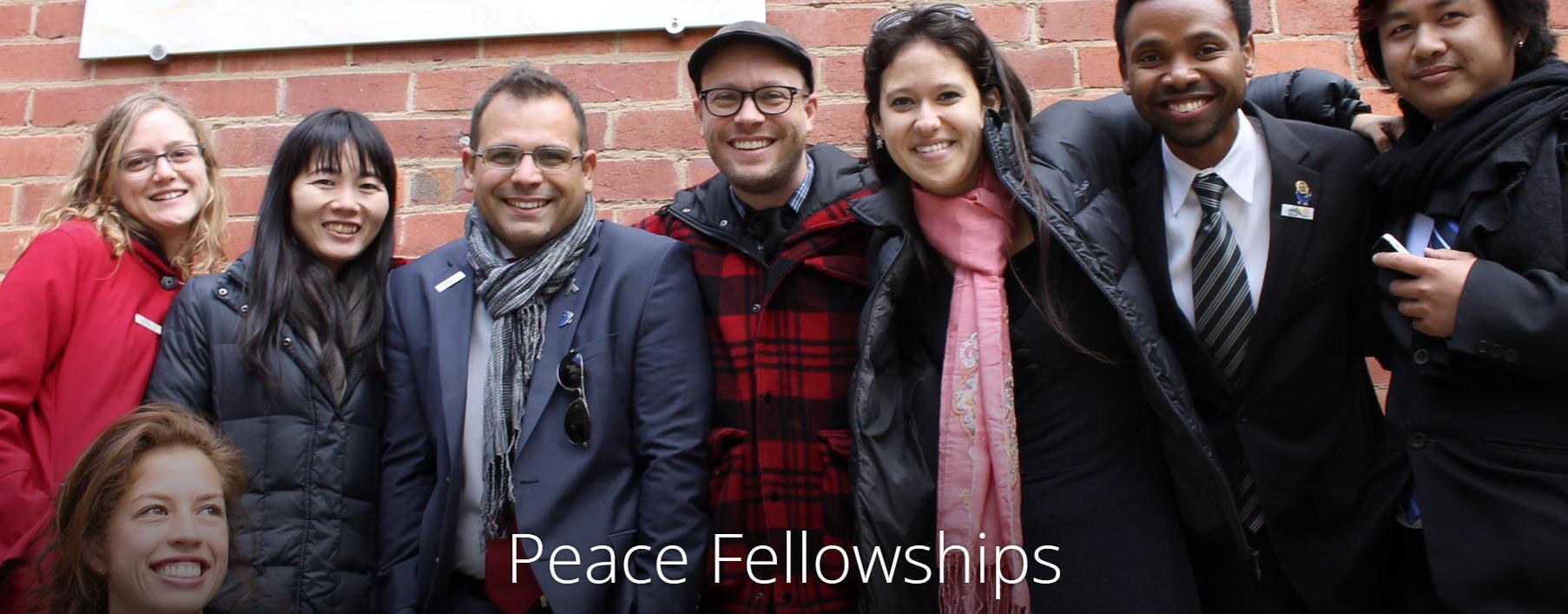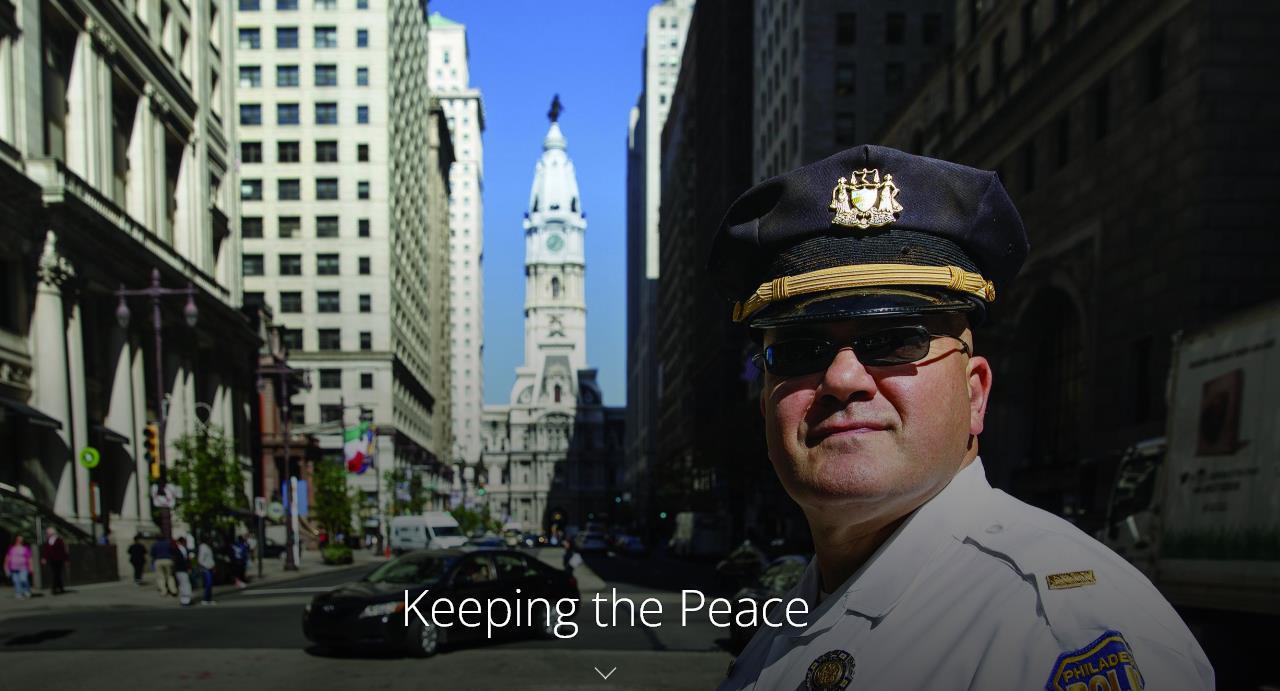
5 minute read
PARTNERSHIPS WITH ROTARY
The Rotary Club of Amherst in Nova Scotia, Canada, partnered with two local churches, the First Baptist and Holy Family, to sponsor two Syrian refugee families. Club members used their experience and skills to help guide the initiative. Watch project leaders from all three organizations talk about how they achieved success.
Watch Rotary members talk about how to sponsor a refugee family.
Advertisement
Click here or the photo below to view the video.
But Syria is not the only war-torn part of our planet.
Click here or the photo below to learn how Rotary Promotes Peace.



Police officer takes the lessons of the Rotary peace program to the streets of Philadelphia

By Bryan Smith Photographs by Matt Stanley
The tension is palpable as we cruise through a neighborhood of dilapidated row houses in one of the toughest parts of Philadelphia. Buildings jaggedly rise from the street – like a mouth full of busted teeth.
Lt. D.F. Pace nods to acknowledge a stare. He understands.
In his 15-year career with the Philadelphia Police Department, Pace has taken pride in being naturally tolerant and level-headed, qualities that helped him rise through the ranks.
But he is human. To maintain a level head under pressure, at times he uses several techniques he learned through the Rotary Peace Fellowship program.
In 2010, Pace applied for the intensive three-month professional certificate program in Thailand. The idea had come to then-Police Commissioner Charles Ramsey through a suggestion from the Philadelphia Rotary Club, the 19th-oldest Rotary club in the world. Pace relished the challenge. “As soon as I saw it, I said, ‘This is a once-in-a-lifetime opportunity.’”
Even before events like what happened in Ferguson (Mo.), I saw an unease developing between police and the community. I thought, ‘If we don’t get a handle on this, the lid’s going to come off.’
Pace saw the fellowship as a way to defuse a developing powder keg. “Even before events like what happened in Ferguson [Mo.], I saw an unease developing between police and the community,” he recalls. “I thought, ‘If we don’t get a handle on this, the lid’s going to come off.’”
The growing tension between police and residents also troubled members of the Philadelphia Rotary Club. They considered a few ideas until Joseph Batory, then scholarship chair of the club, had a light-bulb moment: the peace fellowship.
“Sometimes the obvious is right in front of us,” says Batory. “It finally dawned on me that a police officer is at the very forefront of violence prevention and peacebuilding and, as such, would be a great fit for Rotary’s threemonth certification program.”
In D.F. Pace, known as “D” to friends, Batory believed the club had found the perfect candidate: “He was an up-and-coming young lieutenant with patrol experience on the streets, but he’s also a lawyer and thus wellversed in the legal aspects of proper policing,” he says. “He reflected Commissioner Ramsey’s vision of creating a new generation of police officers with enhanced professionalism, dramatically improved judgment, and dedication to being instruments of peace.”
Friction, racial and otherwise, between police and the people they protect is not new. But the killings of unarmed black men by police in recent years, captured on camera phones and broadcast on the nightly news, have indeed touched a match to the kindling that Pace and others saw piling higher and higher.
Click here to read the rest of this article.
Peace Fellowships – Master’s Degree Programs
The ideal candidate is academically strong, has a bachelor’s degree in a related field, and has work experience in peace and development. We are looking for early-career candidates who demonstrate a commitment to peace and conflict resolution, are able to undertake extensive reading and research, and are able to participate actively within a diverse cohort of students.
Successful candidates have both a record of prior achievements in peacebuilding and potential for future growth and impact as leaders in the field resulting from their participation in the fellowship. After the program, candidates should be willing to share their own work and experience, staying in touch with peace fellows in their region and maintaining strong connections with Rotary members.
Master’s degree candidates must also:
• Be proficient in English
• Have a bachelor's degree
• Have a strong commitment to cross-cultural understanding and peace as shown through professional and academic achievements and personal or community service
• Potential for leadership
• Have at least three years of full-time relevant experience in peace or development work
Candidates must have at least three years between the completion of their most recent academic degree program (undergraduate or graduate degree) and their intended start date for the fellowship. Candidates currently enrolled in an undergraduate or graduate program are not eligible to apply.
Rotary Peace Fellows who have completed the certificate program, or a Global Grant Scholarship, must wait three years between the end date of that program and their intended start date for the fellowship.
We encourage people with disabilities and from other diverse backgrounds to apply. Rotary provides reasonable accommodations as needed to people with disabilities.
You are not eligible if you are an active Rotary member, employee of a Rotary club, Rotary International, or other Rotary entity.
Learn more about eligibility restrictions
Peace Fellowships – Professional Development Certificate Programs
The ideal candidate is a proven mid-career peace and development leader with at least five years of relevant work experience. Candidates need to come to the program with a social change initiative to promote peace and development within the program region and have a clear vision of how the fellowship experience and network will help advance their peace work and increase their impact.
This program is intended for working professionals and requires 11 weeks of on-site participation. Fellows earn a post-graduate diploma upon completion of the program. After the program, candidates should be willing to share their own work and experience, staying in touch with peace fellows in the region and maintaining strong connections with Rotarians.
Certificate candidates must also:
• Be proficient in English
• Have a bachelor’s degree
• Have at least five years of full-time relevant experience in peace or development work
• Have a strong commitment to cross-cultural understanding and peace as shown through professional and academic achievements and personal or community service
• Demonstrate leadership skills
• Be able to explain how their plan to promote peace aligns with Rotary’s mission
• Candidates for Makerere University: Either be from Africa, have worked in Africa, or work with African communities or initiatives outside the continent.
Candidates must have at least three years between the completion of their most recent academic degree program (undergraduate or graduate degree) and their intended start date for the fellowship. Candidates currently enrolled in an undergraduate or graduate program are not eligible to apply.
Rotary Peace Fellows who have completed the master’s degree program, or a Global Grant Scholarship, must wait three years between the end date of that program and their intended start date for the fellowship.
We encourage people with disabilities and from other diverse backgrounds to apply. Rotary provides reasonable accommodations as needed to people with disabilities.
You are not eligible if you are an active Rotary member, employee of a Rotary club, Rotary International, or other Rotary entity. Learn more about eligibility restrictions










